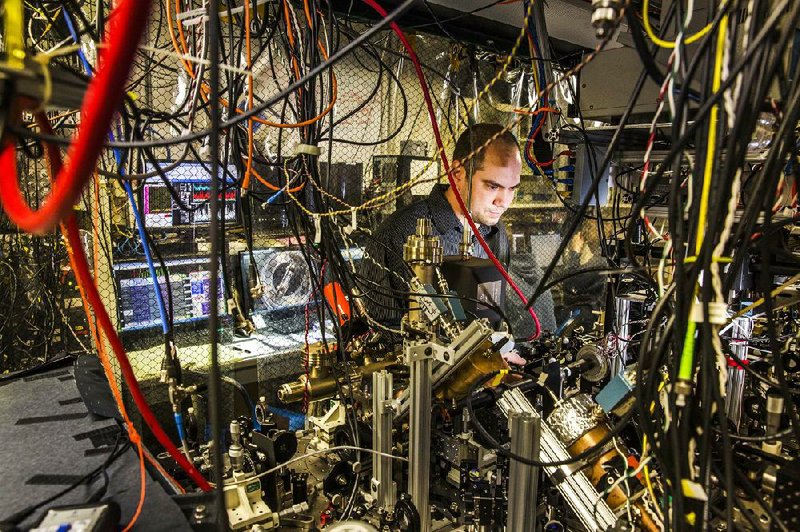Quantum computers - a futuristic vision of ultrafast processors powered by particle physics - sound almost like science fiction.
Current models, which can fill entire rooms, sometime rely on lasers and are often cooled to the temperature of outer space. Instead of using the binary system of 1’s and 0’s, quantum systems use atomic particles, or “qubits.”
In theory, quantum computing could be better and faster than traditional computers at solving problems with rapidly changing variables - such as finding the fastest or cheapest way to schedule flights at an airport or maximizing profit in a stock portfolio.
Quantum computing is years - maybe decades - from widespread commercial viability, scientists say. Still, the concept is attracting attention and investments from large tech companies - such as Google, IBM, Hitachi and Lockheed Martin - that are eager to harness quantum computing’s potential.
Lockheed and Google own what is believed to be the only commercially sold quantum computer: the DWave system, produced by a Vancouver, British Columbia-based startup of the same name. Each D-Wave system can cost several million dollars.
Earlier this month, Bethesda, Md.-based Lockheed Martin established a quantum computing research center at the University of Maryland’s College Park campus, grouping together several existing quantum projects at the school. Lockheed declined to share information about how much it is investing in that or other quantum efforts.
This is Lockheed’s second public-private quantum research partnership - in 2011, it created a similar center at the University of Southern California.
“Classical computing can only take us so far,” Ray Johnson, Lockheed senior vice president and chief technology officer, said in an email. “In the future, critical systems will become socomplex, that problems will take too long or become too expensive to solve using even our most powerful supercomputers. We believe that the next computational revolution will stem from applied quantum science.”
The defense contractor’s clients may be able to use quantum computing to plan logistics, sequence genomes or improve machine learning, among other applications, Johnson said.
The USC-Lockheed Martin Quantum Computation Center, headed by electrical engineering and chemistry professor Daniel Lidar, has been tasked with determining whether the D-Wave system is better than traditional computers at certain computational tasks. In 2010, Lockheed bought its first D-Wave. In 2013, it upgraded to the D-Wave Two, a newer, higher-power model that uses more qubits.
“So far, the results are fairly inconclusive,” Lidar said. “We have identified examples where the D-Wave is a little faster, but we have also identified more examples where it is slower.”
At Maryland’s Quantum Engineering Center, Chris Monroe, a professor who studies quantum physics, has been working on the center’s computing system for the past few years. Lockheed aims to have a quantum computing prototype in five years through its partnership with College Park, Johnson said, although he noted a commercial-grade product would take longer and require more investment.
The quantum device in Monroe’s lab is the size of a small room. It uses lasers of various colors to activate the quantum particles.
“There are so many pieces of equipment that we hold together, not literally with duct tape and glue, but sort of with that mentality,” Monroe said.
The system is particularly sensitive to temperature and humidity fluctuations - if they get two degrees warmer, the lasers expand beyond use.
Quantum computing is far from market-ready, but Lockheed is investing now.
“[W]e believe that quantum computing will enhance our ability to engineer the next generation of increasingly complex systems and technologies while reducing costs and avoiding schedule delays,” Johnson said.
Robert “Bo” Ewald, DWave’s president of U.S. operations, said he expects quantum computing will complement, not replace, traditional computing.
“They’ll run in a hybrid computing mode,” he said, explaining that certain simpler tasks are more easily completed by traditional computers.
Business, Pages 19 on 03/24/2014

